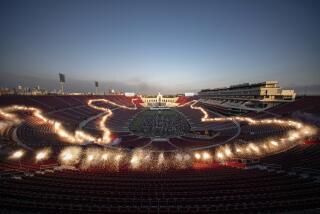After a Long Night, It’s Back to the Games
- Share via
Once it was determined that the Olympics would continue as scheduled, despite the pipe-bomb explosion at Centennial Park, that also meant NBC’s coverage of the Olympics would also go on.
While other networks were still covering aspects of the explosion, NBC went with Olympic rowing, beginning at 9 a.m. Saturday.
But there was a pall over the coverage throughout the day and night.
“I told our people that we should be engaged in covering the competition,” said Dick Ebersol, NBC Sports president. “When there are exciting moments, get excited. But the one gene they should lose today is the humor.”
Before going to Olympic competition, NBC gave continual coverage to the explosion, as did most other news outlets. Then it had Bob Costas, who replaced Tom Brokaw at the NBC News anchor desk, there to update viewers.
The story first broke on NBC4 in Los Angeles, almost as soon as it happened at 10:20 p.m. PDT. That’s because one of its cameramen, Mark Field, and a technician, Ron Liedelmeyer, were on the scene at the time. Field had shot a segment with weather reporter Fritz Coleman in the area about 40 minutes before the explosion.
NBC was showing U.S.-Japan women’s volleyball when Channel 4 broke in with a special report by anchor Chuck Henry in Burbank that there had been an explosion at Centennial Park.
Henry was shown on a split screen in the bottom left, while the volleyball match, without sound, was on in the upper right.
Channel 4 stayed with the split screen, even after NBC went back to the studio where late-night co-host Jim Lampley was conducting an interview with swimmer Gary Hall Jr. But only Henry could be heard.
The magnitude of the story soon became obvious, as Field began feeding the station graphic footage of the aftermath.
One injured woman on the ground waved Field away as lights were shone in her face.
Before the blast, Field shot pictures of the bag in question.
“Ron said, ‘Hey, man, the bomb squad is over there checking out that bag,’ ” Field said.
His footage of the bag and the aftermath was shown by NBC, CNN and most other networks covering the story throughout the night. And Field was later interviewed by Brokaw on NBC News.
He told Brokaw that Liedelmeyer was in front of him and that kept him from being injured. Liedelmeyer took a piece of shrapnel in the neck.
Shortly after the blast, NBC4 anchors Paul Moyer, clad in shorts with jacket and tie, and Colleen Williams came on the air, and were soon joined by Fred Roggin and Fritz Coleman. All had felt the blast and appeared shaken.
Channel 5 was setting up to do a segment with Ed Arnold from a nearby garage rooftop, so it captured some panoramic shots that were used by CNN and other news outlets.
Channel 7 relied heavily on ESPN footage, and got some solid reporting from ESPN anchor Chris Myers.
Myers, who had offered to fill in for Robin Roberts so she could attend some of the competition Friday night, was feeding boxing results to ESPN headquarters in Bristol, Conn., at the time of the explosion.
Myers said he rushed downstairs, from where he anchored ESPN’s coverage. He said Saturday he was unaware his reports were also being used by Channel 7 in Los Angeles. Myers lives in Agoura Hills.
Ebersol was at a party in a hospitality suite on the 25th floor of NBC’s hotel when he was informed of the explosion. He, reporter Jim Gray and a couple of producers rushed to the International Broadcast Center.
Gray joined NBC News reporter Roger O’Neil to help with network coverage, which wasn’t picked up by NBC4 in Los Angeles until after midnight. NBC4 opted to use its own people.
Times staff writer Brian Lowry contributed to this story.
More to Read
The complete guide to home viewing
Get Screen Gab for everything about the TV shows and streaming movies everyone’s talking about.
You may occasionally receive promotional content from the Los Angeles Times.






